Nick Bollinger: trying out his Elvis moves
I met Neville Purvis before I met Arthur Baysting. I was 19 and playing in Rick Bryant’s band Rough Justice. Red Mole were performing their Cabaret Capital Strut at Carmen’s Balcony and whenever we had a night off the whole band would go along to the show. Neville Purvis “at your service”’ was the MC, a dirty-white-suited spiv who filled the gaps between items with tales of his Mark II Zephyr and the education he’d had at Taita College and Mount Crawford finishing school. No character like this had ever stood in a spotlight before. Someone said Neville was actually Arthur Baysting, a poet, but that was hard to believe. The strip club seemed like his natural habitat. He looked like he slept out the back.
One day Rick announced that Neville would be joining Rough Justice for a short tour, Justice Purverted. We would accompany Neville on a couple of musical items: his own song ‘It Takes Money’ and a medley of Elvis tunes. We had one rehearsal during which Neville stayed pretty much in character, trying out his Elvis moves and his own variations on Elvis’s lyrics (“Are you lonesome tonight? If you are it serves you right”).
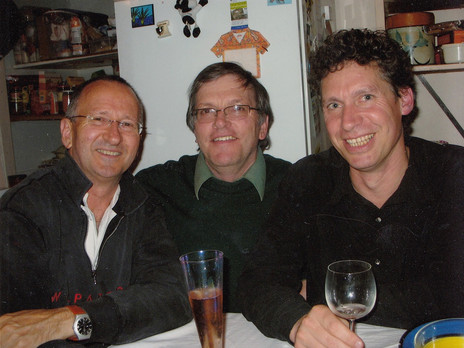
Tony Backhouse, Arthur Baysting, and Nick Bollinger, Grey Lynn, Auckland. - Arthur Baysting collection
It was only once we boarded the Rough Justice bus to start our tour that I met Arthur. He was nothing like Neville. Sitting at the back of the bus on our way to Karamea, he told me he used to write poetry but these days he wrote songs. We talked about The Last Waltz, the documentary about The Band which had just come out. Then he said: ‘Listen. I’ve got something to play you’. He pulled out a homemade cassette and on a battery-operated player we listened to half-a-dozen songs that he’d taped off an obscure LP by the Louisiana songwriter Bobby Charles, backed by The Band. Arthur loved this record so much that he carried a rough dub of it wherever he went. Bobby had written the famous song ‘See You Later Alligator’ but these days was a little-known recluse. Arthur made me a copy of the tape, and we became a private Bobby Charles appreciation society. Arthur especially loved a song of Bobby’s called ‘Clean Water’. He taught it to a class at a primary school in Auckland.
Many years later I was in New Orleans for the Jazzfest and wondered whether it would be possible to track down Bobby Charles. It wasn’t hard. He lived out on the Gulf of Mexico, near the Texas border, and was unexpectedly friendly on the phone. When he heard I had come all the way from New Zealand he invited me to stay. It turned out there was a reason he was so warm and hospitable. Someone in New Zealand years ago had sent him a tape of a bunch of school kids singing one of his songs. He said it was the best gift he had ever had.
But Arthur’s own songs are also gifts, to listeners and anyone lucky enough to get to play them. Over the years he has written a lot with Bill Lake and I’ve played many of those songs with Bill and Rick in the Windy City Strugglers. The first song Arthur and Bill ever wrote together was called ‘Can’t Get Back’. It became the Strugglers’ most requested tune and Rick always sang it with such conviction that everyone thought it was his own life story.
Arthur loves great singers, and we formed another private fan club around the wonderful Will Crummer, father of Annie Crummer, who crooned like a Polynesian Tony Bennett and had been Rarotonga’s biggest star before he moved to New Zealand in the 60s to start his family. When we met him he had given up performing and only sang while he was mowing his lawn in Avondale. But with Arthur’s enthusiasm and goodwill we soon wound up in Roundhead Studios producing an album together of Willie singing his beautiful island songs, which helped relaunch Willie’s career.
Arthur makes so many great things happen for other people, yet always slips into the background as soon as he can, letting others receive the glory. He doesn’t even take credit for Neville Purvis. Whenever I’ve mentioned those magic nights at Carmen’s and how hilarious he was, he’ll say, “That wasn’t me. It was Neville.”
Bill Lake: pushing from the shadows
Arthur made me a songwriter. I had written a few songs before I met him, but he showed me how to write and, crucially, that ideas I overlooked could be turned into songs. When he was doing the Neville Purvis TV show in 1979, he moved to Eastbourne, near where I lived. He invited me round, I started playing guitar, and, as so often happened later, he said as I played a chord sequence, “keep playing that” – which I did, while he wrote very quickly the backbone of the song ‘Can't Get Back’ – the Strugglers’ greatest hit, written as from an old person’s point of view when we were in our early 30s. Most of our writing sessions are like that: him latching onto some guitar figure, getting me to repeat it, and writing with total concentration for a while, then trying it out, then changing it, until we have at least the outline of a song. He is very prolific but also always ready to change or abandon something he doesn't feel is quite there.
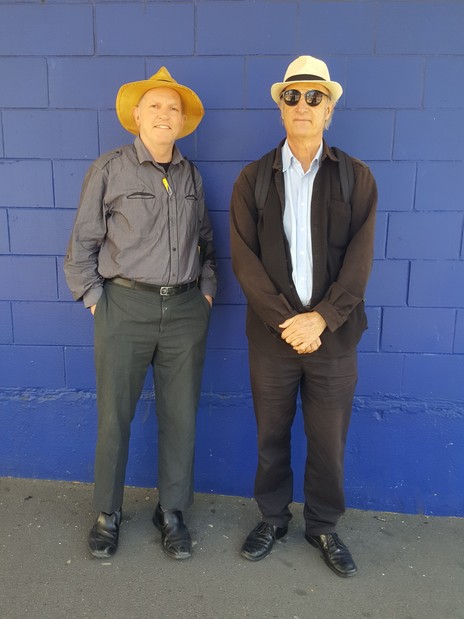
Arthur Baysting and Bill Lake, Wellington, 22 January 2019. - Chris Bourke
This story illustrates a feature of Arthur's writing: he almost always writes from within a persona and a situation (not surprising that he is a scriptwriter). And you could say his preference for personae over personal revelation, that elusiveness, marks his relation to the various worlds he has worked in: he prefers being in the background, pushing from the shadows, helping others to the limelight. I don’t think he does all this entirely for his own enjoyment. I think it is in the interest of moving the culture forward: giving New Zealand a voice, giving children things they can enjoy, stopping bad stuff like smoking ... He is in that broad sense a political activist. I am just one of many he has activated.
Tony Backhouse: now go up one
Until 1979, I had always written songs but it was always a grind: blind gropings & twangings over months or years. But that year, Arthur sat me down with a guitar and turned me on to a more immediate and fulfilling process: writing a complete song then and there. And then another. Three songs in two hours … is that allowed? His restless intelligence removed any pressure to be perfect and immortal, and made it fun. There might still be questions or elements to be massaged, but it was a revelation, and it was refreshing to be the recipient of Arthur’s trust and his refusal to be bogged down by minutiae, just to get the song done.
Minutiae like his lack of piano skills for instance – in later years we could create a piano piece by him giving me cryptic yet open-ended directions, like “now go somewhere else” or “now go up one” or “do something weird”. In this way, Arthur would tell a story, and my function (and pleasure) was to illustrate it – so he led me in directions I could not foresee, musical destinations better than those I would otherwise have chosen.
After any writing session, he’s always trusting enough to leave me to finish our songs alone, with his blessing, to wantonly alter details. And if I had a song that needed one thing, just one thing more, to complete it, Arthur can always come up with that perfect lyric.
I’m very proud of our work together and feel honoured to work with such a generous, lovely man.
Jenny Morris: a moral compass and a cheeky attitude
I feel I have known Arthur all my life and bar about 19 years, that’s true.
Arthur was, is, and always will be unique … a unique spirit, a unique thinker, a unique man. He has a moral compass and a cheeky attitude. He’s not above the “middle finger” response (mostly metaphorical) to a bad government decision or a bureaucratic bungle. Beyond this, Arthur is a dreamer. He dreams often and he dreams big and that’s what I love most about him.
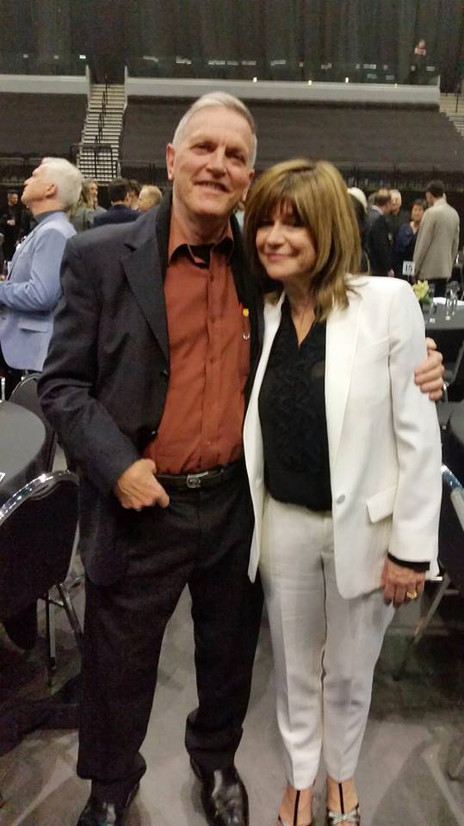
Arthur Baysting and Jenny Morris, APRA Silver Scroll awards, Auckland, October 2018.
My first meeting with Arthur was through music. He was involved in a seminal moment, in fact a seminal song in my life. He co-wrote the song that has become a classic, ‘Tears’. When you listen to those lyrics, you are listening to pop poetry. Arthur knows what he’s doing when he writes a lyric. He is the seer of the zeitgeist.
He told me I should stand for election to the board of Apra in 1995 (when he was the New Zealand Apra writer-director) … which I did. Way back then he was an agitator for women’s rights. Apra is now coming close to parity when it comes to women writer-director numbers on the board.
Lobbying for children’s TV is his latest worthy focus. “There’s no local TV for kids under five in New Zealand,” he told me recently. “I want to change that.”
He’s a gentleman and a prince, as they say (although he was the first person to say fuck on New Zealand TV). Mr Laconic, Mr Cool.
Peter Dasent: the most wonderful imagination
I met Arthur in 1979, so it’s been 40 years. He wrote lyrics, I wrote music, so we were a good fit. And we had similar tastes: Randy Newman, John Prine, Ray Davies and of course The Beatles. We wrote pop songs for The Crocodiles, then songs for my first film score, Peter Jackson’s Meet The Feebles. We continued to write with no one in particular in mind, until in 2000 I started playing piano for the long-running Australian children’s TV series Play School. One of the presenters was Justine Clarke, who liked the songs Arthur and I were writing for our own kids, and said yes when I suggested she record them. That was 2005, and the album I Like To Sing eventually went platinum. That collaboration led to another five albums and two ARIA awards. Arthur has also written two children’s books with Justine Clarke.
The thing about Arthur is he has the most wonderful imagination. He can become a three year old, and write a song from that place, but use all his accumulated songwriting knowledge to make the lyrics funny, magical and meaningful. He can always find a new angle for a song for pre-schoolers. Also, he wants to get the lyrics right. Many a time I have thought that a song was finished until Arthur suggested a change to one word, or one line. And conversely I can say to Arthur “this line doesn’t work musically,” and he’ll come up with a solution.
We write in all sorts of different ways. Together in the same room. Via Skype. Over the phone. Via email. Whatever it takes. We both know when a song is finished, and we thrash it out until that happens. Our attitude to children’s songs is that they need to be the best we make them, because we all want the best for our kids.
As much as Arthur and I share musical tastes, we also differ in what we listen to. I’m not a huge country music fan, and Arthur detests ELP. What we have in common is we love a great song. And I reckon we’ve written a few.
Chris Bourke: a warm hearth
We met in October 1985, at the Rip It Up 100th issue party, but it was just a handshake in a crowded room. There was music to be listened to: Ray Columbus, Al Hunter, a Dudes’ frontline reunion, the Bird Nest Roys. A couple of years later, while waiting for a bus that actually came – the No.27 to Grey Lynn – we finally had a proper conversation, and it hasn’t stopped since.
Always there have been dreams, schemes and themes – and usually they revolve around songs. What makes a good one. The idea of “the song” as an entity, that has a life of its own. How to get more local songs heard on radio. But these weren’t earnest brain-storming sessions, making policies as well as making tea: always there was something unexpected involved to get an idea across the line. Arthur’s serious goals were achieved with tenacity – and delivered with humour. And usually the conversation would turn to Randy Newman, the Beatles, Dylan, or Elvis.
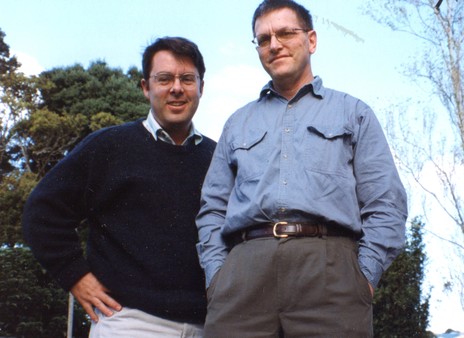
Chris Bourke and Arthur Baysting, Grey Lynn, 1999 - Jean Clarkson
In February 1989, after my stint at Rip It Up, he came and visited me in Wellington, drank his tea, looked around the room and saw a piano. He said, “You play the piano. You can write. You love Randy Newman. You can write a song.” Well, he was right about Randy Newman. We drove around the harbour to Eastbourne, so I could drop him off at Bill Lake’s. On the way, we parked up to emulate Leiber and Stoller. But Leiber didn’t need another lyricist, and Stoller was a good pianist. There would be other ways to collaborate.
We hit State Highway One for a road trip back to Auckland. The tangential conversation covered post-war New Zealand social history, popular and counter-culture, Randy Newman, the Beatles, Dylan, and Elvis. We stopped in at a farm near Taihape, and the singer Mark Kennedy strode out and said, “Arthur. Good to meet you. I’ve never forgotten seeing Neville go to the Foxton races. We quoted it for months.”
Arthur smiled and said, thanks. Then, “Are you still writing songs?” “Actually I wrote one the other day, first time in ages.” That night, Arthur looked round the room, and saw a guitar. “Is that yours? Do you play guitar?” Mark said, “Nah, it’s Dan’s. He left it here the other night.” Mark joined the road trip to Auckland.
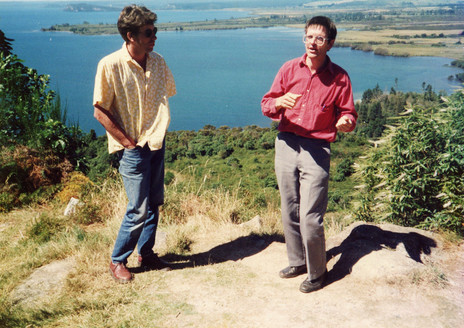
Arthur Baysting, right, with Mark Kennedy, near Tokaanu, February 1989. - Chris Bourke
When I was in the US a few months later Arthur wrote to suggest I go to Nashville to chase up a story about the Fisk Jubilee Singers visiting New Zealand in the 1880s. A dead end there led to a research scoop, over my mother’s back fence in Wellington. The radio drama he had in mind – with Tony Backhouse arranging the music – is yet to appear. There are so many ideas.
For 30 years it has felt like we are in cahoots. In the Venn diagram of New Zealand culture, Arthur is in the middle of countless intersecting circles. Jean and Arthur’s kitchen felt like a warm hearth, the family environment exemplary. They introduced me to Pasifika. One night the three of us watched a doco on VHS covering the arc of Elvis’s career. After a totally engrossing couple of hours, it finished with a gruelling scene: Elvis at his very last concert, pounding the piano keys and sweating while singing ‘Unchained Melody’. The song is histrionic and so is Elvis, throwing himself into it like an Italian opera singer.
Afterwards, we sat there, stunned. Arthur went to make a pot of tea, and we waited for what seemed like hours. Finally Jean and I rushed to the kitchen. “Arthur! What’s up?”
Arthur was leaning over the tea pot, spinning it around, slowly. He looked up and said, “I’m just having a little cry about Elvis.”
Mike Chunn: his army coalesced
At the 1997 Apra Silver Scroll Awards function, a buoyancy filled the room. There was a clarity and a coolness and light, and the hundreds of songwriters present sensed that vision and purpose of what was in essence Arthur Baysting’s vision. He knew that the answer to a transformed nation of respect, celebration and reward for New Zealand songs and their writers was all about people. He knew it wasn’t about formal campaigns, rigid proposals and taking to the fourth estate with proclamations. And there at the Silver Scroll function in 1997, everyone knew it when Arthur spoke from the stage. His army coalesced. His words were uplifting. The change was under way …
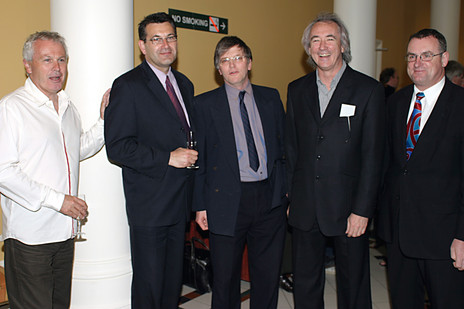
At the APRA Silver Scroll Awards in early 2000s, from left: Mike Chunn, Bill Moran, Arthur Baysting, Brent Eccles, and Trevor Mallard.
In 1999 Arthur and I were standing outside the Beehive, having had another meeting with yet another Minister of Arts and Culture who wasn’t seeing our point of view, when the good doctor Michael Cullen walked up out of the blue and asked, “This music commission – what will it look like?”
Arthur responded instantly with, “I’ll have our document on your desk this afternoon.”
Cullen was happy with that and strolled away.
I looked at Arthur quizzically. “What music commission document?”
“Leave it with me.”
Arthur bolted through the parliamentary doors and disappeared. He went up to Judith Tizard’s office, scrounged the use of one of their word processors and wrote off the top of his head a brief on what a working music commission would look like. Two hours later the document was on Cullen’s desk.
Arthur wrote about the profile of New Zealand music (where was it?), what wasn’t on radio and why not, music in education, and more. It was nothing less than a mission statement for an ideal world where music, words and recordings stood up and people took notice! For Christ’s sake – these were our songs. If anyone heard them, it should be New Zealanders!
From A Sharp Left Turn: Notes on a life in music, from Split Enz to Play It Strange by Mike Chunn (Allen & Unwin NZ).
Petrina Togi-Sa’ena: influence, impact, inclusion
I began working at Apra in 1994 and Arthur was the New Zealand writer-director on the Apra board – a position he held for 18 years, from 1992 to 2010. I was very lucky to begin my career working with Arthur and I have seen first-hand the influence and impact that he has had on our music industry.
Arthur’s time on the Apra board was during an important era for New Zealand music. The role was perfect for him and the direct responsibilities for this role would have been more than enough to undertake, but Arthur extended his involvement and was very active with Apra’s work for its members. He would participate in Apra’s member seminars and events around the country, contribute to new initiatives, write content for the Aprap magazine and was actively involved in the annual Silver Scroll Awards. Most importantly, he was always available and accessible to Apra’s members, taking on queries and concerns and worked tirelessly on their behalf.
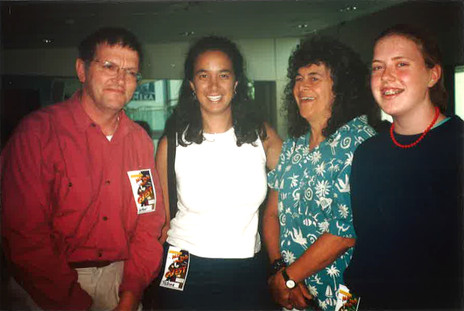
Arthur Baysting, Petrina Togi-Sa’ena of the Pacific Music Awards Trust, Jean Clarkson, and Rosie Baysting. - Petrina Togi-Sa’ena collection
Arthur as a person, is naturally empathetic, considerate and inclusive with everything he does. Arthur understood and enacted diversity and inclusion, before these were the priorities that they are today. With Apra he strived to ensure what we did was representative of our membership and New Zealand – this would be across aspects such as culture, gender, ethnicity and music genres. In particular he would support and advocate for Maori and Pacific songwriters and music. Successful initiatives supported by Arthur were the introduction of the Apra Maioha Award; connecting Apra with Te Matatini, and supporting the Pao Pao Pao event established by Hirini Melbourne and the Waiata Maori Music Awards with Tama Huata. For Pacific music, Arthur worked with Pacific radio; contributed to copyright seminars in the Pacific region; he was involved in Apra hosting its own information tent and performance stage at the Pasifika Festival; and he supported the establishment of the Pacific Music Awards, and Apra’s role as a sponsor.
Arthur directly influenced some Apra events that took on a life of their own, such as the “Scrollettes” which were held around the country at the time of the Silver Scroll Awards, so that we could connect with members living outside of Auckland. The format was a workshop, followed by drinks/food and a live jam session – and were some of the best Apra events we ever hosted. Arthur was also instrumental in creating the infamous ‘Second Stage’, which was the live jam session that happened after the Silver Scroll Awards. Given it was the Scroll night, it was always a jam like no other, with countless people jumping up, to sing their own originals – and he also implemented the two-song limit. This was one of Arthur’s favourite Apra things. With Mike Chunn and Sony Music, he also produced Nature’s Best, the CD compilations which celebrated the nation’s favourite New Zealand songs and was one of New Zealand’s best-selling compilations.
Along with the many things he did – that went unseen or weren’t so high profile – was the work behind the scenes to support Apra members. He lobbied government for positive changes to legislation for copyright owners, and support for songwriters with their careers. Arthur’s influence was absolutely pivotal for the nation’s songwriters/composers. As anyone knows, effecting change through government and legislation – is not an easy or quick task – and Arthur’s tenacity and focus to the cause, was pivotal in contributing to change occurring.
As co-director of the NZ Music Commission, Arthur was able to channel his passion for New Zealand music, education and Pacific music, with key projects including, the Music Mentoring programme – taking artists/songwriters directly into schools (which is still going today). He directed an educational resource of New Zealand music for schools: ‘Sweet’; Making Music – He Waihanga Pūoro. This series of 47 short docos – featuring New Zealand artists playing acoustic versions of their songs and talking about their careers – was provided to schools and a selection is now available through NZ On Screen. Arthur was also instrumental in the Music Commission’s focus on Pacific music, which resulted in a project to archive Pacific music, plus seminars and workshops hosted throughout the country, a music handbook for Pacific artists Pasifika, and a promotional CD Pacific Niu Sila of Pacific music.
During his time with Apra and at the Music Commission, there was a strong shift in the value of local music, the acknowledgement of local content and the importance of celebrating and championing our homemade creators. This is something that we are all grateful for and all still continue to share in the benefits of this work.
I feel Arthur’s greatest achievement is his support and encouragement for songwriters to continue to write. For songwriters and composers, the music industry is not an easy road. I know his support and motivation were invaluable. Arthur was big on collaboration and he would encourage others to find new co-writers all the time, enabling new music to be written.
Arthur was generous with his time, he would say yes more than he would say no and he would always support anything that benefitted songwriters and promoted New Zealand music. He was always creating himself, constantly writing songs, and collaborating with others. He is an amazing songwriter, a passionate campaigner and a genuine soul. Working with Arthur has been one of the most special gifts of my life.
He is a constant motivator of others, and one of his great sayings reflects this. At the end of a seminar or meeting he’d often say, “Your best song is the next one you’re going to write.”
Peter Tait: sticky wickets
I’ll have to be more subjective than objective, because I see him more as a friend than someone I am an expert about. We just share a few interests like writing comedy, Bob Dylan and … cricket. Most people might not realise, but Arthur used to be a very handy wicket keeper. What kept him from further honours in the Nelson region was a chap called Ken Wadsworth, who went on to play for New Zealand, and then died of melanoma at a young age.
But by then Arthur had moved on to Wellington, playing only the occasional social game of cricket, writing, and then inventing a character called Neville Purvis, hooking up with the lovely Jean and having Jim and Rosie. It was not unknown for him to sneak away from social occasions to check the score when New Zealand was playing either cricket and rugby.
Arthur’s obsession with cricket led to a long-time friendship which helped when making a short film called Bradman, about a cricket game disrupted by a dog. After a bit of bureaucratic bumbling I managed to get the film made, and Arthur acted in it. I have never had a budget remotely resembling it since. Not that Arthur hasn’t been supportive along the way. He keeps me buoyant that life is okay and I should keep on writing no matter whatever the changing guard of gatekeepers at organisations like the Film Commission might say or suggest.
Unless of course one counts the good fortune to hook up with John Clarke. He liked my story of a U-boat that came around New Zealand in 1945, and then he died and so did the project.
But Arthur helps to keep me alive: I’ve dug drains for him, painted his bathroom … he once stipulated that when we meet we had to come up with an original song each. Now I am a three-chord guitarist, at a push four, if you include minor chords. But it was a good challenge and excellent for creative juices.
He even got me a long-term job. It involved being a caregiver for Chris Knox. “He’s going to have to like the idea of you doing it … and Barbara will too.” So for five-and-a-half years, a couple of days a week, I was with Chris for 10 hours a day.
I never had a built-in radar for how to “work a room” or “pitch a project”. I could only marvel at how Arthur could do it. He would walk up to these people who would not deem to give me the time of day, unless to mention, “I might have seen you in a short film.”
Arthur acted in another called Bogans and did a fine job. He has always been there for me, and when I try and explain what my latest crazy idea is, he listens. If I appear on his doorstep dressed as a tramp … or as a well-dressed woman … he does not turn me away. He turns it back on me, asks me what it is I want to say – and listens. You can’t ask for much more in a friend … which he has been.
He was a wicket keeper. He could’ve stumped me many times, but he chose not to. Arthur is who he is. Not a bad bloke besides.
Meralda Warren: Sank yu myse friend
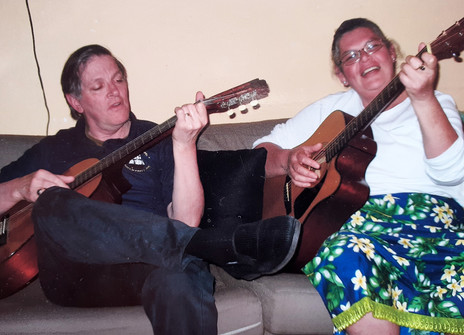
Arthur and Meralda Warren.
Pitcairn Island, January 2020 – I met Arthur through his wife Jean Clarkson who is my best friend and Ahu Sista. We came together for our first art exhibition on Tapa in Tahiti in October 2008. This was where we first all met. Arthur was so supportive of our work and the story of the Bounty women. With James, their son, he made a video about the Ahu Sistas: four seventh-generation Pitcairn descendants who have joined together to reclaim their history and revive Pitcairn tapa making. They tell the women’s story of the Bounty mutiny.
I arrived in New Zealand for medical issues, straight from Tahiti. While recovering, Arthur told me how interested he was in my songs. I had sent Jean my two CDs, made in 1999 and 2005. Little did I know who Arthur was in the music world.
I was amazed at his talent and his interest in this simple Island woman who had written songs to help the children to keep their language, their homeland and their heritage.
Arthur and Jean invited me to their home and pretty soon the ukuleles and the guitars come out. The songs we sang were feelers to bigger challenges, Arthur at the time being the New Zealand representative on the APRA board. He persuaded APRA to allow me to register with them.
Me being a British Overseas Territory resident, with only the rights to live on Pitcairn Island my Homeland, I didn’t have the rights to anything in New Zealand or Australia. I have to have a visa to visit these places. I was educated in the New Zealand curriculum on Pitcairn, our currency is New Zealand, our Governor and office staff work in New Zealand but we don’t have the privileges of New Zealand.
I returned home early 2009 but had to return to hospital again mid-year. I stayed with Jean and Arthur again and soon with pen and paper we started writing songs together. Jean and Arthur’s friends came around too as Sackville Street is the best hang-out place ever and I met some of his songwriting friends.
We penned many songs together. And knowing Arthur’s passion for writing songs for kids, we wrote ‘The Hump Back Whale’, ‘The Gardener’, and ‘The Turtle’.
He was insistent that I record some of the songs which I did in the room downstairs using Garage Band. The CD Here Comes Mama with Her Niau Broom came forth with eight tracks. The ninth track was with us all singing it together. Even my niece Darralyn joined in.
I went with Arthur to the Silver Scroll awards event in Christchurch. It was amazing being there. Being with talented musicians and catching up with the music world and people that circle Arthur and Jean’s life. I was humbled to be included.
Every song I write, every new one that I sing, it’s always in my mind, “I wonder if Arthur likes this?”
There are many songs that I have written but haven’t recorded and he has told me over the phone “to never give up”, and “record them”.
In my home on Pitcairn, I have some of the musical instruments that we played around with. The frog (an ocarina), a small drum, a bamboo drum, a few other small chimes and ukuleles that are helping the children to play too.
As I venture out to write songs with another friend, Randy Key, I feel you there Arthur, saying “Relda, you can do it.” Together one day we will all sing “in the sweet bye and bye.” Sanks fer mi.
Cath Andersen: audacious schemes
There are a couple of different creation myths for the New Zealand Music Commission, but which of them you believe doesn’t really matter – in the end, Arthur Baysting was the one that really got the wheels turning. If you know him, that’s not surprising: Arthur is a guy that Makes Things Happen.
As the organisation grew, other – younger – people joined the ranks who couldn’t believe the tales of what Arthur had been up to in his previous life. The narrative of the first “F bomb” on New Zealand television was well recounted, but never by the protagonist himself, and posters of Neville Purvis and Red Mole even appeared above an office door like a shrine in a teenage bedroom.
Speaking of posters, one of the projects Arthur undertook for schools required some artwork, so he commissioned Chris Knox to draw cartoons of all manner of New Zealand musicians involved. That David D’ath of the Skeptics appeared next to Hayley Westenra – and Logan Bell of Katchafire – was entirely natural to Arthur. They were all “exemplary New Zealand artists”, regardless of their genre or style.
Posters aside, Arthur’s true legacy at the Music Commission are the programmes he established in his “make things happen” role. He has a real knack for finding the people who can help his ideas become reality, no matter how audacious the schemes are. Alongside the publication of contemporary music textbooks for schools with sheet music (and the aforementioned poster), educational DVDs and CD-Roms (!), one of his biggest plans was to have New Zealand artists go into schools from Kaitaia to Bluff as mentors to work directly with music students. The artists would make multiple visits to each school, and they would be paid properly for their time. Eighteen years on, hundreds of artists and over 28,000 students from all across Aotearoa have participated in the Musicians Mentoring in Schools Programme. That is a lot of music from a lot of artists in a lot of schools.
Suzy Cato: music for Kiwi kids
For someone who has done so much for the New Zealand music industry – and, more recently, for its children’s music industry – you can’t find anyone more humble, or more modest, than Arthur Baysting. His reticence to crow about his successes hides the passion with which he has campaigned for change, for a very long time. But anything Arthur does he does 110 percent and he does it not only from the heart but with every fibre of his being.
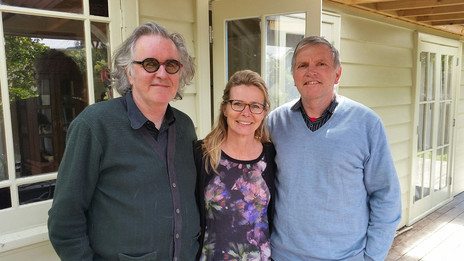
Arthur Baysting with children's songwriting collaborators Peter Dasent and Suzy Cato, Auckland. - Suzy Cato collection
Arthur has long been a champion of children’s content: not just for their ears, but for their eyes. He began writing music for children in 1995 with a lullaby, ‘Lullaby for Coco’, and has created over 60 songs for kids with his long-time friend and writing partner Peter Dasent (the father of Coco). A great number of those songs were for Australian pre-school icon, Justine Clarke. In fact Arthur’s first album with Justine and Peter went platinum, the next two gold and Justine has received two Arias for albums which have included songs by Arthur and Peter!
But Arthur wrote his first drama for kids with another writing partner – Ian Mune – a couple of decades before his children’s songs. After co-writing Sleeping Dogs with Ian, the two created the wonderfully wild The Mad Dog Gang Meets Rotten Fred and Ratsguts.
With two gorgeous grandchildren of his own now, Arthur’s joy in the creation of music and the magic of storytelling – that sparks the imagination, encourages participation and entices kids to get up on the dancefloor – has grown exponentially.
While on the board of Apra, in 2007 Arthur saw an opportunity for the organisation to better support local creators of music for children and under his guidance a children’s music symposium was held. This united the children’s music industry in a way that hadn’t happened before. Then in 2008, with the support and encouragement of Arthur, Apra Amcos NZ and Recorded Music NZ created the annual NZ Children’s Music Awards. An awards event that continues to celebrate the work of local artists, to this day, and which is now also supported by NZ On Air.
In the ensuing years Arthur has provided mentorship, guidance, inspiration, encouragement and a writing partner to countless numbers of singer/songwriters, forging wonderful friendships and relationships with artists round the country.
In early 2016 Arthur succeeded, with the help of a handful of like-minded passionate kids’ content creators, to form the organisation Kiwi Kids Music, dedicated to supporting, encouraging and promoting music made for New Zealand kids, artists and producers. Apra Amcos NZ supported Arthur’s initiative from day one, and on the strength of the development of KKM worked with its partners to create a standalone event for the NZ Children’s Music Awards, with the first event being held in their offices that year.
Arthur continues to write, to champion for quality children’s content and to encourage the best from local artists. His primary goal is for kids to hear, see, experience and enjoy songs and stories created for them, about them and often with them. The consummate gentleman, and gentle man, Arthur sees the best in everyone and every opportunity: with a little workshopping, no song is unsingable, and no voice not that of a singer’s.
Arthur’s talent, and his love of the tamariki of New Zealand (of all ages) knows no bounds. We are all so much the better from having shared even the shortest of times with this generous, compassionate and caring man, and with the other of his loves, his beautiful wife Jean, whose love and support of Arthur is mirrored only by his love and support for her.
Justine Clarke: wonder, magic, peace and joy
Arthur Baysting is a magical gift that keeps on giving to the world.
He’s a very kind and slightly wicked father figure to me. He’s a poet, an incredible lyricist, a passionate advocate for children’s rights and a loyal supporter of artists and lover of art in all its forms.
Over the past 14 years we have written songs and books together and our preferred method of collaboration has been over Skype, where no idea is a bad one. Arthur has taught me so much about songwriting just by the way he collaborates. He gets really genuinely excited when you offer something to the process, he’ll explore an idea with you to the end and yet some how the song or story always retains his unique and charming style.
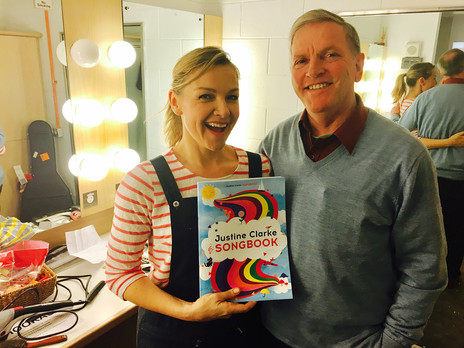
Arthur Baysting with Australian performer and TV presenter Justine Clarke.
Nobody writes a children’s song like Arthur. He comes from a place of wonder, magic, peace and joy. All the places kids start from. And just like kids, he’s a rule breaker. Things don’t always rhyme in exactly the right spot, he makes up his own words, he totally messes with the form and yet it always makes your heart sing in just the perfect way.
He’s also a massive fan of so many other musicians and songwriters, so willing to heap praise on good songwriting and always searching to be better.
He has written a enormous and epic list of incredible songs that have joined the canon of children’s classics that are performed and sung all over Australia in classrooms, at home, in the car and on TV. As we compile the list for our “Best Of” album this Christmas, a collection of songs from five albums of material, I’m enormously proud to have been a part of this very meaningful and joyful contribution to the planet.
Ant Healey: a two-handed assault for culture
I am not sure when Arthur decided to become a writer – of songs or anything else. Very possibly there was never a conscious, fork-in-the-road type decision, as I doubt Arthur ever really had a choice. He has never been anything else. As a songwriter, scriptwriter, speechwriter or children’s music writer and advocate he’s an honest and formidable, quiet force.
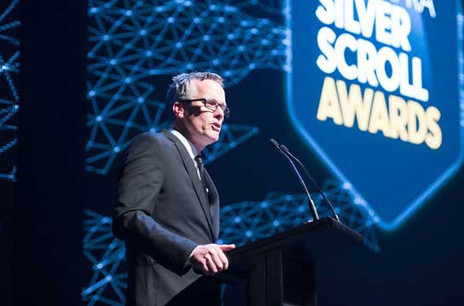
Ant Healey at the 2014 Apra Silver Scroll Awards. - Apra Amcos
When Arthur was the New Zealand writer-director on the Apra board he ensured that what was a commercial operation had our culture at its heart. He set the tone. He and Mike Chunn performed a two-handed assault on the power and purse-string holders at the time – of all political persuasions – to achieve their goal of success for New Zealand music and the people that make it. This was typical of most of what Arthur does and the way that he does it. He works in collaboration. Whether it was with Chunn or others in his creative pursuits, Justine Clarke and Peter Dasent in Australia, Fane Flaws or Bill Lake here in New Zealand, Arthur worked with others. He’s written 468 songs (or at least that’s how many are registered in the Apra system), each one written with someone else. I suspect his greatest collaboration is with his partner, Jean.
I’ve got no idea how Arthur writes but I suspect he brings good ideas to the table. I gave up ignoring Arthur’s ideas long ago as I learnt pretty quickly that even the craziest, most outrageous notions were ultimately worth giving a go. Establishing a New Zealand Children’s Music Awards may seem a reasonable idea now but 10 or so years ago – when the children’s music writing community was basically invisible – it was fanciful. Now it’s an event held at Spark Arena with hundreds taking part, and many more hundreds attending.
Joel Little: why don’t you just do it?
When I was nine years old Arthur came to my school to take a class on songwriting. I was heavily into Vanilla Ice at the time and had started trying to write raps. The first song I ever wrote was called ‘I Love My Car’ which used a couple of lines lifted straight from ‘Ice Ice Baby’. I remember nervously sharing it with the class and Arthur saying “well it’s best not to steal directly from another artist’s work, but this is really cool”. As a fairly low-key kid who wasn’t big on putting himself out there I found this incredibly encouraging.
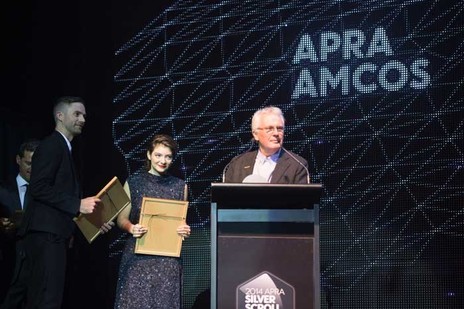
Joel Little and Ella Yelich-O’Connor (Lorde) receive the award for 'Royals' being the most-performed work overseas in 2013-2014, presented by Mike Chunn, former Apra NZ head of operations. - Apra Amcos
Years later, I was fresh out of high school and trying to start the band that would become Goodnight Nurse. Arthur was working at Apra at the time and I met with him to get some general industry advice. When I mentioned we’d been trying to find a singer for months he said: “Why don’t you just do it? Just start playing gigs and either you’re going to get better at singing or it will put you in a situation where you’ll meet someone who fits. Otherwise you could be waiting around forever hoping things will fall in to your lap.” So we did what he said: I started singing and while it’s arguable as to whether I got better we had a blast playing in that band for nine years.
I’m not sure he realised the magnitude of what he was doing at the time, but that’s twice that Arthur’s words have had a profound effect on my life. Since then I’ve taken “why don’t you just do it?” and applied it at pretty much every big turning point in my career: it’s helped me learn how to record, how to co-write, how to produce. It’s probably the best piece of career advice I’ve ever been given, and if it weren’t for Arthur it’s very unlikely I’d be where I am now. In an alternate universe I’m still outside Shadows taping up “Singer Wanted” posters.
Rev. Mua Sofi Strickson-Pua: Ngati Humankind, the tribe of humanity
E sau le fuata ma lona lua.
In every generation there are some outstanding Chiefs.
– Alaga Upu Fa’a Samoa [Samoan Proverb]
In our Fa’asamoa – Samoan cultural practice – we introduce ourselves first, then proceed to the task at hand. So: tena koe in te reo Maori of Aotearoa, greetings all and talofa lava aiga, family of humanity. I am the Reverend Mua Strickson-Pua, Ngati Hamoa, Cantonese, Saina, Irish, French, Gafa whakapapa genealogy. Or as our mokopuna lovingly express: Ngati Humankind, the Tribe of humanity.
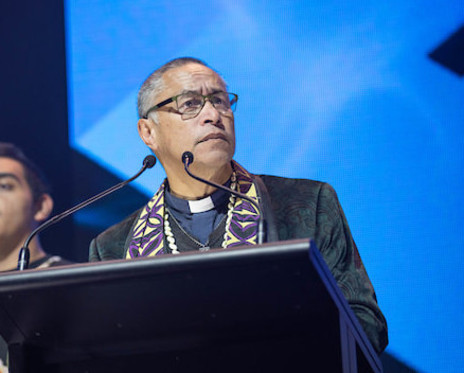
Reverend Mua Strickson-Pua at the Pacific Music Awards 2019. - Pacific Music Awards Trust.
Mamalu is a beautiful Samoan word when expressing honour, hence with Arthur Baysting he has honoured us all with his tautua: his service to our family, community, and nations. Then there are the various creative industry boards and committees he serves on passionately. Three-hundred words in Samoan oratory is but a breath when honouring Arthur.
Our Ngati Hamoa ways always acknowledges Arthur as Arthur Baysting and Jean Clarkson an amazing loving couple of Fa’atuatuaga, Hope, and Filemu, Peace. Respecting and honouring their relationship and partnership in the struggles for social justice and social change in Aotearoa for all people. The Fa’aaloalo – the Manaakitanga – they extend and praxis inspires us for our shared futures. Pasifika feel rather daunted by global geo-political neo-liberalism economic ideology and the self-harm to our Mother planet climate change crisis. Humanity requires our special people to step up and stand out as our young Pasifikan musicians would say. Arthur is one such special person who is known as the Champion for Aotearoa New Zealand Music but also of so many other kaupapa, whakapapa and mahi.
The personal stories are numerous but here are some: when we arrived in Auckland in 1990, Arthur and Jean welcomed us into our Grey Lynn family community, for projects such as the curtains at Grey Lynn Community centre, the Grey Lynn Festival, Nesian Mystik our sons, to Pasifika festival, Apra Silver Scroll, and Pacific Music Awards. Arthur Baysting is a Pakeha Palagi leader who has understood the inter-tribal cross-cultural multi-ethnic discourse, dialogue and discussions required for our unity, as the Ngati HumanKind, the family of humanity who honours and celebrates an Aotearoa society of Inclusiveness and diversity. Atua continue to bless manaaki us all, Aroha Alofa Agape.
E sau le fuata ma lona lua.
In every generation there are some outstanding Chiefs.
Aiga, Whanau, Family – we are honouring Arthur Baysting.
--
Contributors
Nick Bollinger is a Wellington musician, writer and broadcaster
Bill Lake is a Wellington musician and songwriter
Tony Backhouse is songwriter, musician, and international a capella advocate
Jenny Morris is a singer and songwriter, and chair of Apra Amcos, Sydney
Peter Dasent is a pianist, songwriter, and film composer, Sydney
Chris Bourke is content director of AudioCulture
Mike Chunn is a musician, writer and CEO of the Play It Strange Trust
Petrina Togi-Sa’ena is a trustee and event producer of the Pacific Music Awards, Auckland
Peter Tait is a Northland actor, writer and director
Meralda Warren is a singer-songwriter from Pitcairn Island
Cath Andersen is chief executive of the New Zealand Music Commission
Suzy Cato is a children’s music entertainer and chair of the Kiwi Kids Music Trust
Justine Clarke is an Australian actress, singer and television host.
Ant Healey is head of New Zealand operations at Apra Amcos, Auckland
Joel Little is a New Zealand songwriter, producer and musician
Mua Sofi Strickson-Pua is an Auckland chaplain and chair of the Pacific Music Awards